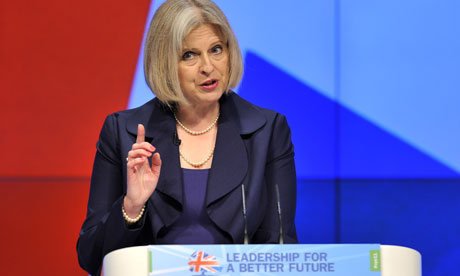Leave human rights law to the judges
Theresa May's attack on the Human Rights Act is irresponsible, and diminishes our democracy
By Derry Irvine
guardian.co.uk, Tuesday 11 October 2011 22.00 BST
Theresa May criticises the Human Rights Act at the Conservative party conference. Photograph: Ray Tang/Rex Features
Theresa May's unjustified attack on the Human Rights Act at the Conservative conference was deeply irresponsible. The immigration appeal decision in question shows it was her department's failure to follow its own guidance, and not a cat, which ultimately prevented the appellant's deportation. Even more disturbing, but unsurprising, was that when justice minister Ken Clarke robustly defended the judiciary, the prime minister came down on the side of the home secretary. It seems David Cameron is happy to lecture governments abroad on human rights and the rule of law, but disregards them at home.
The deportation of offenders is but the latest focus for the Tory right and the tabloid press in their incoherent attacks on the HRA. It is of a piece with similar attacks when judges have prevented the indiscriminate publication of salacious celebrity gossip, or raised the prospect of prisoners being given the right to vote.
Ironically, the main proponents of the European convention were Conservatives, including Churchill and Macmillan. The convention was substantially the work of British jurists in a tradition going back to the Petition of Right of 1628 and our own Bill of Rights of 1689.
The Human Rights Act 1998 brought the convention rights home; to be enforceable in our own courts, while maintaining the supremacy of parliament.
Conservative MP Jesse Norman and Peter Oborne have written that the HRA is on the political agenda largely due to the tabloids' commercial dependence on stories about celebrities' private lives. They have thus waged a campaign of misinformation against the HRA, especially the right to respect for private and family life under article 8, which May and Cameron have joined with enthusiasm.
The prime minister has accused judges of creating a privacy law, when it should be parliament which decides "how much protection we want for individuals and how much freedom of the press". There are two straightforward answers.
First, the HRA requires judges to balance the right of respect for private and family life against the right to freedom of expression in article 12. However, it is often the rights of innocent third parties, including children, which need to be balanced. There is typically no public interest in disclosure of the peccadilloes of footballers or reality TV contestants. Nonetheless, the weight courts give to freedom of expression is illustrated by the recent refusal of an injunction to Rio Ferdinand.
Second, the government could introduce tomorrow a freedom of expression bill compatible with the convention, if they dared. But it is far easier to berate judges for doing what parliament has instructed, than have the courage to legislate themselves.
The media have gained greatly from the convention and the act: enhanced protection for journalistic sources; a dramatic reduction in libel damages; and the right to report on a wider range of court proceedings. When impartial courts hold the balance between privacy and freedom of expression, the media cannot expect to have it all their own way.
The controversy over votes for prisoners has been another Tory cause celebre. The European court has held that our blanket ban should be reconsidered. As a result of the HRA, this will be done in the proper forum: parliament. The ban has put us out of step with most other states in the Council of Europe, including Germany, France, Italy, the Netherlands, Portugal and Spain. It is surprising then that the prime minister should claim he felt physically ill at the prospect of giving a vote to prisoners. All that was held at Strasbourg was that the ban was disproportionate as it applied irrespective of the length of the sentence or the gravity of the offence.
Another ruling which raised his bile was the supreme court's decision on the sex offenders' register. They declared incompatible with the convention statutory provisions that imposed on certain sex offenders lifelong obligations to inform the police of their whereabouts. Such offenders could not even apply to be removed from the register, regardless of rehabilitation. But even if a right to apply were introduced, it would again be for parliament to determine the criteria for success.
The PM told parliament the decision was completely offensive and flew in the face of common sense, while the home secretary questioned its sanity. All the judges were doing was applying the law. Respect for the rule of law underpins our democracy. That respect is not a commodity to be traded for short-term political advantage; when it is, ministers diminish both themselves and our democracy. As Lord Pannick recently commented, there are countries in which the government win all their cases in court, but these are not places in which any of us would wish to live.
Clarke's Ministry of Justice this year announced an independent commission "to investigate the creation of a British bill of rights that incorporates ... all our obligations under the European convention, ensures that these rights continue to be enshrined in British law, and protects and extends British liberties".
These terms of reference indicate that the European convention will continue to be a guaranteed floor, but not a ceiling, for the protection of human rights in Britain. Given that, it is all the more unfortunate that the prime minister and home secretary persist in opportunistic and irresponsible attacks on the HRA and the judges who have been charged by parliament with applying it.


No comments:
Post a Comment